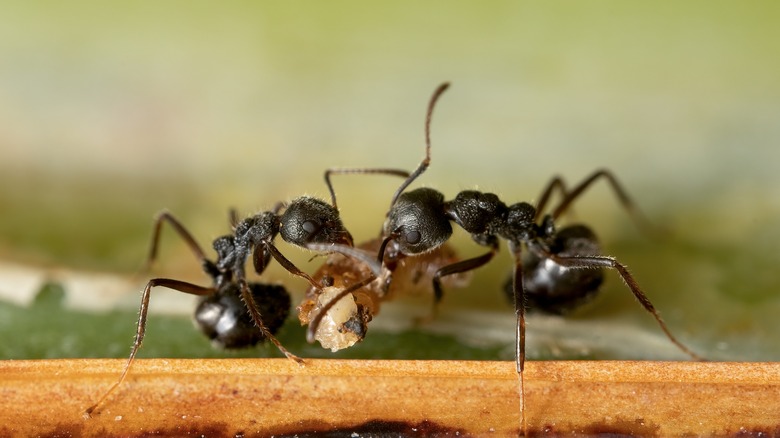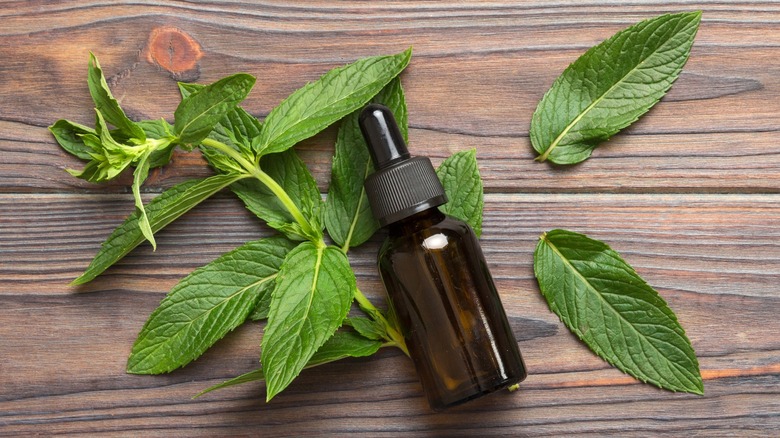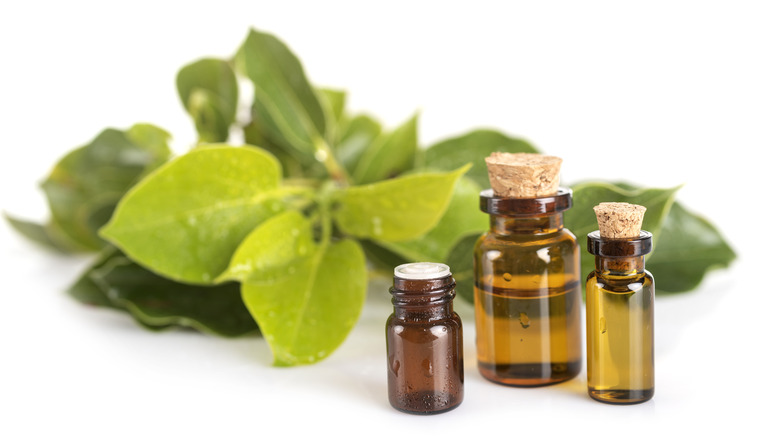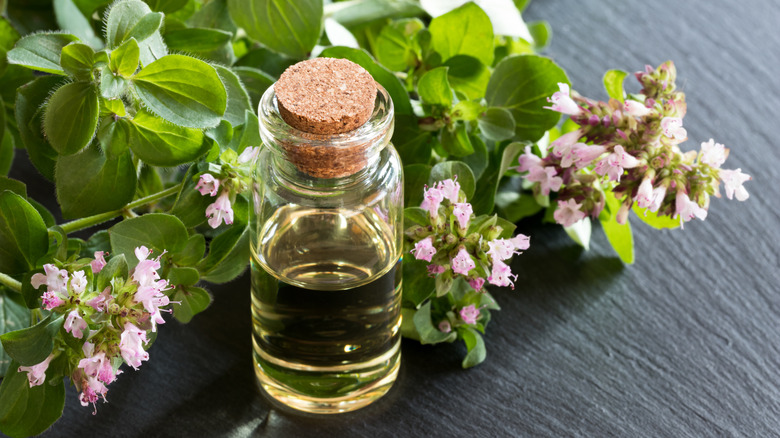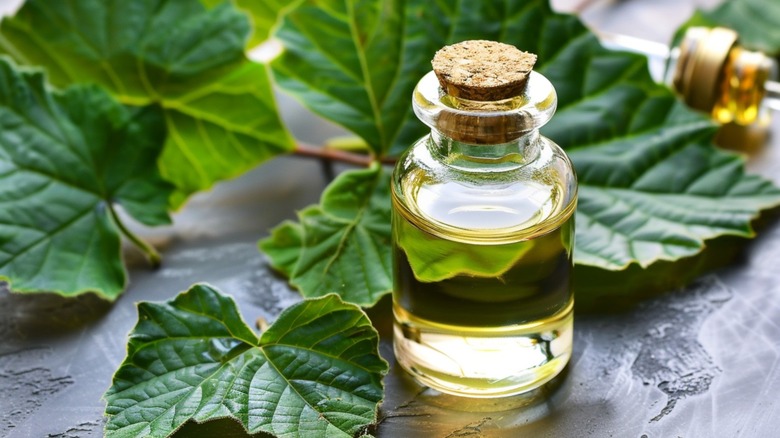8 Essential Oils To Naturally Deter Ants From Invading Kitchen Cabinets
Ants don't just bite. As anyone who's had the misfortune of stepping on an ant hill knows, they can also painfully sting their victims. Ants create large mounds that disturb landscaping, congregate by the thousands near swimming pools, and after heavy rains, often seek shelter indoors. This migration frequently spreads diseases to food and dishes in your kitchen, including Salmonella and E. coli. Thankfully, essential oils may be one of the best ways to get rid of ants that have invaded your kitchen cabinets.
As people get pickier about what goes onto their plates and into their favorite products, essential oils have become a multi-billion dollar business. Whether you're lighting a citronella candle to keep the mosquitos away or using neem oil spray to keep pests off your plants, it's likely that you're already using these powerful plant compounds around your home. But does using fragrant essential oils to get rid of ants really pass the smell test?
According to a peer-reviewed journal, Bioresource Technology, the first real laboratory test of essential oils used to repel bugs took place in 1919. Citronella oil, derived from Cymbopogon (more commonly known as lemongrass), was popularized by the 1940s. Because mosquito, arthropod, and tick-borne illnesses pose significant public health risks, many scientists are still working hard to determine exactly which essential oils are the most effective against pests. When you're specifically looking to deter ants from invading your kitchen cabinets, evidence suggests that oregano, patchouli, and at least six other essential oils will safely do the trick.
Cinnamon essential oil is toxic to ants
Research has confirmed cinnamon is toxic to ants, with one 2008 study published in Bioresource Technology showing that cinnamon essential oil can kill ants in under two hours or in less than 20 minutes if they have direct exposure. Popular as a flavoring because of its spicy aroma, cinnamon is safe to use in the kitchen but should be handled with caution because it can irritate the skin and cause respiratory discomfort. There are many clever ways to use cinnamon to naturally deter household pests. Try applying cinnamon essential oil to cotton balls tucked into the corners of your cabinets.
Mint oil is safe for the kitchen
Mint essential oil is also effective at banishing ants from your home. One 2004 study published in the Journal of Economic Entomology indicated that mint oil granules kill more than 50% of ants present within 30 minutes. In lieu of cinnamon oil, consider adding a few drops of mint essential oil onto some cotton balls and place them around the infested areas. Alternatively, you may want to consider growing the tasty herb in your house to keep pests out. Each peppermint leaf contains a percentage of mint essential oil and can be safely used inside kitchen cabinets or drawers.
Camphor is one of the most effective essential oils
If you've ever used over-the-counter ointments for relief from a bad cold or sore muscles, you're probably familiar with the pungent smell of camphor. Derived from Cinnamomum camphora, a fragrant tree native to Asian countries, camphor essential oil is acknowledged as one of the most effective natural ant repellents. It can neutralize ants attacking, feeding, climbing, or crawling around your kitchen. Don't have any camphor essential oil on hand? Don't worry. You can get rid of ants with a handy item from your medicine cabinet: Vicks VapoRub.
Oregano essential oil may be a safer choice
Oregano deters ants thanks to its linalool content. A colorless chemical that naturally occurs in a variety of plants and flowers, linalool is commonly found in popular bug repellents, including Off! and Raid. However, other ingredients in these products can be harmful to humans and pets. What's more? Dr. Wayne Buhler for Pesticide Environmental Stewardship reveals that more than 500 insect species are showing some level of pesticide resistance. Try substituting your favorite store-bought bug repellent with a few drops of oregano essential oil mixed with water to deter ants in your kitchen.
Lavender works but isn't the best option
Lavender is the most popular essential oil, and for good reason. Along with working well to banish bad smells from your upholstery, oil extracted from the spiky purple flower is used in personal care products, from baby shampoo to body lotion, because it is considered one of the mildest plant oils. Although lavender essential oil is environmentally friendly, it is only a moderately effective insect repellent. If you already have an ant problem in your kitchen, you may want to choose another one from our list.
Many different citrus oils kill ants naturally
There are several ways to use citrus around the house. Grapefruit, lemon, and orange essential oils are extremely effective at killing fire ants naturally, which has been proven by farmers who use orange oil mixed with water and dish soap as a spray to kill the ants without harming their crops. All three citrus oils contain D-limonene, a compound found in products like Simple Green and Goo Gone, that works as both a solvent and repellent to keep fire ants out of your home.
Eucalyptus oil works well but isn't safe for pets
Eucalyptus essential oil can be used as a natural alternative to commercial ant repellents. Just one or two drops directly applied to cabinet corners can be highly effective because its major compound, 1,8-cineole, is highly toxic to unwelcome insects. Although there are many ways you can use eucalyptus essential oil in your home, remember that it is highly toxic to cats and dogs, too. If you have pets, this is not the safest way to get rid of ants in your kitchen.
Patchouli oil is easy to find and smells great
Relatively inexpensive and easy to find, patchouli is a very commonly used essential oil for aromatherapy. Extracted from the medicinal plant Pogostemon cablin, patchouli is well-known for its earthy, woody scent which is beloved by perfumers but hated by insects.According to a 2013 study in Acta Tropica, this popular oil is one of the best natural ant repellants because it can cause neurotoxicity and tissue damage to unwanted pests. According to fragrance experts, it's also one of the easiest ways to make your house smell amazing.
